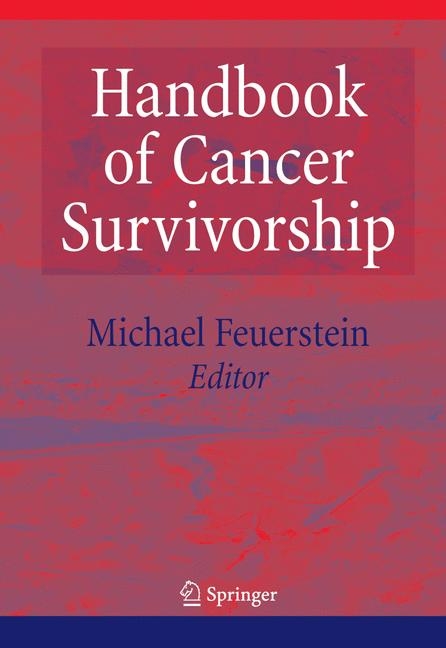
Handbook of Cancer Survivorship
Springer-Verlag New York Inc.
978-0-387-34561-1 (ISBN)
- Titel erscheint in neuer Auflage
- Artikel merken
Not long ago, a cancer diagnosis was regarded as an automatic death sentence; today there are ten million survivors. Equally impressive is the growing number of clinicians and researchers dedicated to improving the quality of survivors’ lives and care. Yet despite this encouraging picture, there has never been a reliable central source for relevant clinical information — until now. This book, written by a cancer survivor and sixty other top scientist-practitioners, responds to the diverse needs of survivors and their support communities by comprehensively addressing the major issues in the field, from the burden of survivorship to secondary prevention.
Michael Feuerstein, Ph.D., MPH is Professor in the Departments of Medical and Clinical Psychology and Preventive Medicine and Biometrics, Uniformed Services University of the Health Sciences, F. Edward Hebert School of Medicine, Bethesda, Maryland. He is also Director of the Clinical Psychology Doctoral Program at that institution. In addition, he is Clinical Professor in the Department of Psychiatry, Division of Behavioral Medicine, at Georgetown University School of Medicine, Washington, DC. Dr. Feuerstein is founder and editor-in-chief of Journal of Occupational Rehabilitation and recently launched (2007) Journal of Cancer Survivorship: Research and Practice, as well as editor of the Handbook of Cancer Survivorship. He is a Fellow of the Academy of Behavioral Medicine Research, the American Psychological Association, and the Society of Behavioral Medicine. As a cancer survivor himself (brain cancer) he focuses his research and advocacy work in the area of cancer survivorship, helping to improve the health, health care, well being and functional recovery of cancer survivors of all types. This latest book addresses many aspects of research and practice related to work following primary cancer treatment, This book was compiled as an effort to improve the lives of those cancer survivors who desire to return and remain at work.
Burden.- Cancer Survivorship.- The Burden of Cancer Survivorship.- Quality of Care.- Quality of Life in Long-Term Cancer Survivors.- Health Care Disparities.- Measuring Quality of Life in Cancer Survivors.- Common Problems.- Exercise Motivation and Behavior Change.- Fatigue.- Pain.- Depression.- Interpersonal Relationships.- Adaptation in the Face of Advanced Cancer.- Secondary Prevention.- Restoring Emotional Well-Being.- Physical Activity for Cancer Survivors.- Nutrition and Weight Management in Cancer Survivors.- Management of Chemotherapy-Related Cognitive Dysfunction.- Smoking Cessation and Cancer Survivors.- Psychological Distress, Depression, and Anxiety.- Managing Daily and Long-Term Stress.- Pain and Function.- Work.- Comprehensive Long-Term Follow-up.- Survivor and Provider Perspectives.- Survivor Perspectives on Quality Care.- Living with Advanced Cancer.- International Perspective.- Global Considerations.- Future Directions.- Cancer Survivorship.
| Zusatzinfo | 51 Tables, black and white; XX, 504 p. |
|---|---|
| Verlagsort | New York, NY |
| Sprache | englisch |
| Maße | 178 x 254 mm |
| Gewicht | 2690 g |
| Themenwelt | Sachbuch/Ratgeber ► Gesundheit / Leben / Psychologie ► Krankheiten / Heilverfahren |
| Medizin / Pharmazie ► Gesundheitswesen | |
| Medizin / Pharmazie ► Medizinische Fachgebiete ► Onkologie | |
| Medizin / Pharmazie ► Physiotherapie / Ergotherapie ► Rehabilitation | |
| Studium ► Querschnittsbereiche ► Epidemiologie / Med. Biometrie | |
| ISBN-10 | 0-387-34561-2 / 0387345612 |
| ISBN-13 | 978-0-387-34561-1 / 9780387345611 |
| Zustand | Neuware |
| Informationen gemäß Produktsicherheitsverordnung (GPSR) | |
| Haben Sie eine Frage zum Produkt? |
aus dem Bereich


